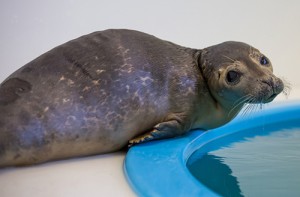
BETHANY — A juvenile harbor seal rescued on the beach in South Bethany in serious condition is now on the mend and responding to treatment at the National Aquarium in Baltimore.
On February 26, the Marine Education, Research and Rehabilitation (MERR) Institute rescued a yearling harbor seal from the beach in South Bethany. The young seal was underweight and presenting with signs of illness and parasite infestation. The seal was lethargic and the prognosis for recovery was guarded at first, but the yearling harbor seal is now being treated at the National Aquarium and appears to be on the mend.
The National Aquarium’s Animal Rescue Team for the last week has been treating the young seal, which weighed just around 40 pounds at the time it was rescued on the beach. The juvenile, now known affectionately as “Megatron” is undergoing long-term rehabilitation at the aquarium with the goal of ultimately releasing the young seal. Ironically, the seal’s namesake, NFL star receiver Calvin Johnson also known as Megatron, announced his retirement this week.
According to National Aquarium Animal Rescue Team officials, Megatron is currently being treated for dehydration, emaciation and skin lesions consistent with seal pox, but is responding well to treatment. In fact, aquarium officials reported this week Megatron is responding well to his fluid therapy and antibiotics. The juvenile seal began eating on his own this week and continued to enjoy a hefty diet of capeline, herring and mullet and appears to be on his way to recovery and ultimately re-release.
Meanwhile, seals of all species and sizes will continue to appear occasionally on the beaches and other areas including rocks, piers and docks around the bayside in and around the resort areas including Ocean City and Assateague and coastal Delaware in the coming weeks. For the most part, the seals are typically healthy and just resting and sunning themselves on the beach or on jetties, docks and piers before moving along in their migration. In some cases, the seals are injured or ill and require rescue and rehabilitation.
With the return of seals along the coastline in the resort area will be an in-kind number of curiosity seekers and photographers intent on interacting with the often adorable visitors. However, the Maryland Coastal Bays Program and the aquarium’s Marine Animal Rescue Program continue to reiterate the importance of observing from a safe distance and protecting and preserving their privacy.
Anyone observing a seal that may be in need of medical attention can call the National Aquarium’s Stranding Hotline at 410-373-0083, or the Maryland Natural Resources Police (NRP) at 800-628-9944. The Maryland Coastal Bays Program also has a link for reporting seal sightings on its website at www.mdcoastalbays.org.
